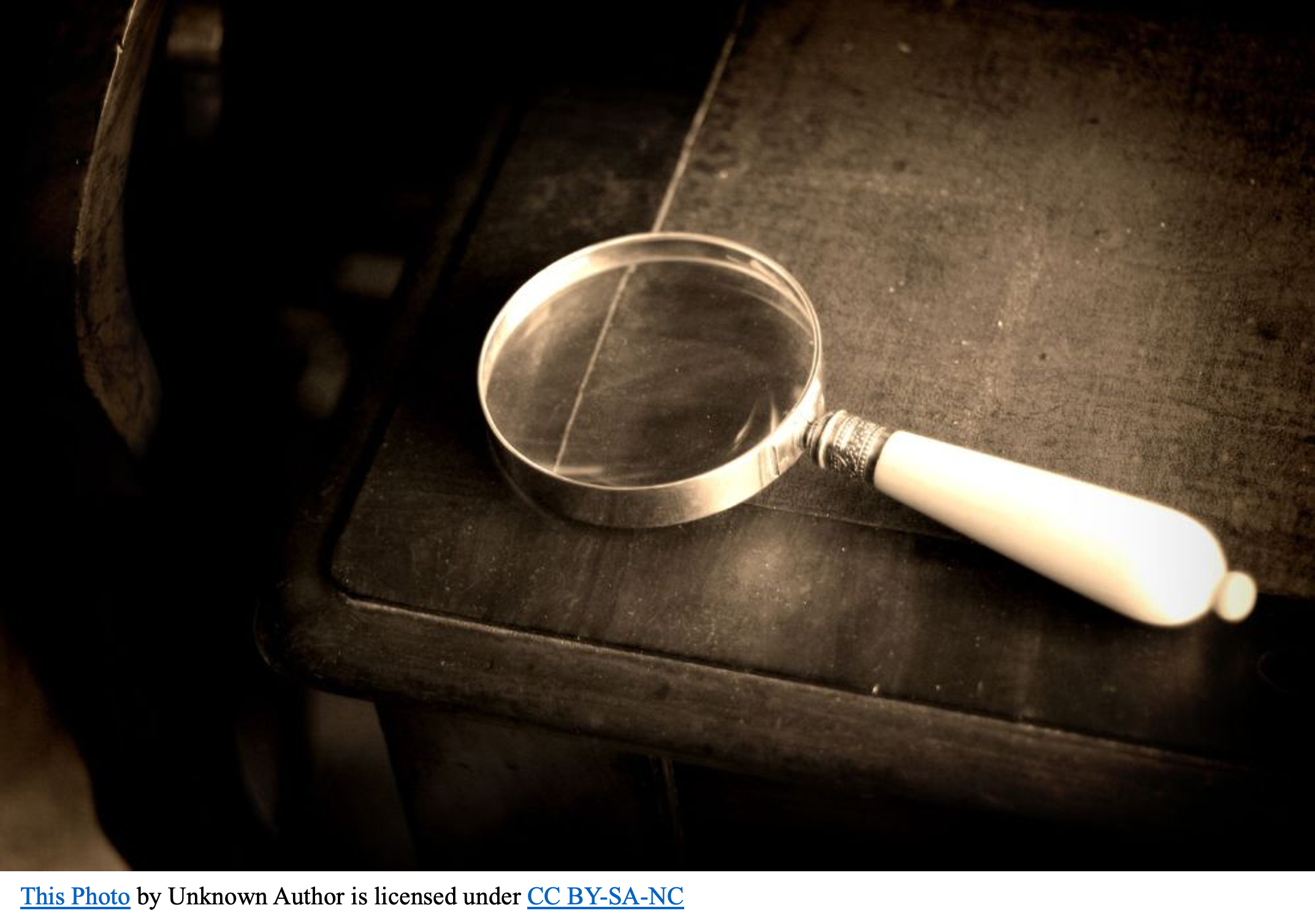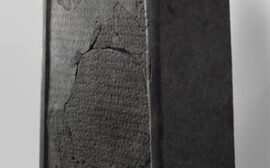By: Tony Williams | May 7, 2023
When it comes to detecting untrue statements about Jesus, the effort can at first seem overwhelming. Because there are no living men or women who were eyewitnesses to interview, we must evaluate written records and compare that to what we can find in history and archeology that can illuminate what is true and what is false.
As a police officer, this is analogous to simply reading witness statements and comparing them to the crime scene to see if there is reason to trust what the witnesses say. Witness statements that are not concocted are never identical. They often have statements that may seem at first to be out of line with another’s statement. Often these are issues of differing perspectives or perceptions of what occurred. Occasionally, there are interlocking statements that allow investigators to tie unknown pieces of the puzzle together through a process of triangulation. It may take many witnesses’ statements to explain all the evidence found at a crime scene.
In the Bible, we have many witness statements. This collection has been brought together and held up as the true “Gospel.” While some additional books have been maintained in some Christian sects, those books do not do anything to alter a major Christian doctrine or provide some reason to doubt the other books. As this paper is about detecting untrue statements about Jesus, I will not go into how many amazing proofs of the content exist to corroborate the Bible in the studies of history, archeology, geography, and many other avenues of scholarly inquisition. Suffice it to say that the Bible has stood the test of time when it comes to the accuracy of details of people, places, and events.
With that said, before we detect false statements about Jesus, we must determine which statements are factual. U.S. Secret Service Agents are responsible for identifying and investigating forged currency. If you had to train these agents to identify all the potential ways to fake money and all the copying errors to look for, it would take decades, and the list would only grow with each day that passes. To save time and more efficiently find the fakes, Secret Service Agents are trained in the details of genuine currency to identify fraud when one of the bills has something out of place.
In the same way, to identify untrue statements about Jesus, we should start with what Christians claim are the true accounts of Jesus’ life in the Gospel accounts of Matthew, Mark, Luke, and John. We can evaluate their accuracy and then test other accounts against those accepted versions of the Truth.
As accomplished cold-case homicide investigator and atheist-turned-Christian apologist J. Warner Wallace points out, there are four reasons the accepted Gospels we have that describe the life, death, and resurrection of Jesus are accurate transmissions of eyewitness accounts. [1]
Four Reasons the Accepted Gospels Are Accurate
Early
The written accounts in the New Testament were early, they were corroborated, they have not changed over time, and they are not biased. Critics of Christianity often make claims attacking the accuracy of the accepted, modern Christian Gospels. One criticism is that the Gospels were written long after the events occurred. This, it is said, would diminish the accuracy of eyewitness accounts and leave room to make details up by later actors in a scheme to make Jesus out to be more than He was. However, an examination of the writings and the history of their entrance into the canon (accepted writings) shows they were written at the time that those who saw the events were still alive.
The fact that no authors mention the destruction of the Temple and siege of Jerusalem indicates that all the Gospels and the book of Acts were more than likely written before A.D. 70. There is also no mention of the deaths of the Apostle Paul (A.D. 64-67) and James the brother of Jesus (A.D. 61). Some details indicate the writings were in circulation even earlier. This would mean that people who were alive to have seen the events would have been able to expose the writings as frauds or testify to their truthfulness.
The fact that the Gospels (and much of the New Testament, it seems) were likely written during eyewitnesses’ lifespans destroys a common myth often repeated by skeptics that claim the Bible developed itself during an evolution like the telephone game; information was altered and exaggerated as time passed, leaving us with accounts that were not historical. But a careful examination of the evidence shows that is simply not the case with the accepted writings of the New Testament.
Corroborated
One important piece of any investigation is to corroborate details of statements by those involved to the physical evidence located at the scene or in a place only a witness would be able to lead you. The events detailed in the Gospels and Acts are set in a time in history when many other historians took note of events in the Roman empire, which included Judea.
There is a fallacy that the Bible is the only recording of the events it describes. This is simply not true. While many of the historians and other sources that corroborate the stories in the New Testament would have been against Christianity, they nevertheless provide outside evidence that the events were widely known across the Roman Empire. These outside historians included Thallus (52 AD), Tacitus (56-120 AD), Mar Bar-Serapion (70 AD), Phlegon (80-140 AD), Pliny the Younger (61-113 AD), Suetonius (69-140 AD), Lucian of Samosata (115-200 AD) Josephus (37-101 AD), and other sources that mention events described in the New Testament, or the effects of these events on civilization. [2]
The fact that people outside the writers of the Bible acknowledge the events were widely known in the decades immediately following the time they are said to have occurred is important for those interested in verifying the veracity of the Bible. In any investigation, it is crucial to find independent witnesses that can place a suspect at the scene of a crime. Like the witnesses who see the suspect near the scene, the New Testament has many witnesses outside the Bible to verify that the events described were occurring at the time it was claimed.
Accurate
Another common argument against the Bible is that it was simply a number of stories that were cobbled together and grew into a supernatural fairy tale. Critics insist the stories must have been embellished and altered over time and that the story simply evolved if it had any historical basis. The problem with that criticism is that the accounts are timely and corroborated, as summarized above. Furthermore, copies of some of the earliest manuscripts have been located to examine and compare against what we have now. There is a mountain of historical documents to show exactly what changed from the earliest manuscripts to what we have in our modern Bibles.
Critics of the Bible often claim that there are hundreds or thousands of “variants” of the books of the Bible. If it was true that there are hundreds or thousands of versions of the Gospels, how can we know what happened, they ask. Rightly so if it were true. However, what they consider variants are not wildly different versions you might envision. As Tim Barnett points out in an article at Stand to Reason, most scholars estimate about 400,000 variants of the New Testament. [3] That sounds like a vast number, especially considering that only about 138,000 words are in the New Testament.
But what constitutes a variant? The “variants” include a word spelled differently (about 70% of the variants) or when a phrase is altered in a way that does not change the sentence’s meaning. Scholars acknowledge that only around 1% of the variant versions have anything that changes the meaning of a sentence or paragraph. However, not one of these sentence variants affects one central doctrine. If you want to know what they are, grab a Study Bible, and you will likely find them all listed at the bottom of each page in the footnotes. I promise you will not be impressed with the impact of these variants on the text we have today. The Bible we have today has been faithfully copied and translated from the first generation of Christians to the generation now on earth.
Unbiased
The final indication that the Gospels tell an accurate story is that the authors were unbiased. History tells us that the Apostles and authors never recanted their stories and suffered horrible deaths for refusing to recant their testimony. They had no fame or power to gain from their work, only persecution, incarceration, and death. They tell embarrassing details of their own behavior that reflect an honest accounting. Even today, when a witness takes the stand to testify if they make themselves out to be perfect or clearly have a reason to attribute the crime to the suspect, a judge or jury will rightly consider those things. If they acknowledge their own wrongdoing and no reason for gain can be demonstrated, then they gain credibility in their testimony.
Comparing the Texts
Now that we have a description of what makes the accounts of the New Testament stories of Jesus believable, we can compare that to some of the other manuscripts that exist about Him. As we examine some of the writings that critics point to, how do they compare with our agreed-upon 66 books that make up the Bible? Luckily, those who came before us have done the heavy lifting on this multiple times in history. We are not the first generation to try to identify false claims about Jesus, as it turns out.
A process was undertaken early on to decide true Gospel from false. The church fathers asked comparable questions to those asked today by apologists like J. Warner Wallace. They asked if the text was from an apostle or someone close to an apostle, was the book accepted historically by those who were alive in the time of Christ, was the text consistent with the other, accepted texts in terms of doctrine and teaching, and did the text align with the character of God. [4] Councils subsequently affirmed what they considered accurate accounts of Jesus and called it canon, which comes from the Hebrew and Greek word for reed. Reeds were historically used to measure, and the term canon indicates a sense of accuracy.
Late and Uncorroborated
The church fathers certainly had the advantage to be able to call upon people who may have witnessed events described in the Bible, or at least people who knew eyewitnesses and heard their testimony before their deaths. The books left out of the canon still contain reasons we, in the 21st century, should be skeptical of their veracity. In line with Wallace’s framework for accuracy in the texts, we can see that many of the non-canonical texts were far later renditions than that of the accepted accounts. He points out that the Gospel of Thomas was written between 130-150 AD, the Gospel of Mary was written between 120-180 AD and the Gospel of Judas was written between 130-170 AD. [5] No one living would have been a witness to the events described in those works to verify or falsify the claims.
Inaccurate
The writings not accepted by the early church fathers as canon were not accepted because the early leaders of the church watched them appear and knew them to be forgeries. There is an unbroken chain of men who write about events that occur in the early church in letters we have discovered, and they even speak about the false gospels. One of the early leaders, Irenaeus, wrote about the “indescribable number of secret and illegitimate writings, which they themselves have forged, to bewilder the minds of foolish people, who are ignorant of the scriptures.” [5]
Biased
The most telling feature about these bogus accounts of Jesus is the fact that they so clearly try to advance a particular idea that is not in line with the accepted Biblical doctrine. Many of these false gospels have a strongly gnostic angle. The Gnostics were heretical in their view of Jesus and tried to claim a hidden wisdom beyond believing in Christ as Savior that was necessary to achieve true freedom from sin and death. Though they may not realize their identity as gnostic, the gnostic ideas are still hard at work in 2023, and their tactics to co-opt the Bible have not changed.
Summary
One unfortunate thing that many believe today is that the life of Jesus is shrouded in mystery and confusion. Critics go so far as to say that Jesus was not even a real person, even though our historical calendars divide time before His birth and after. The impact of Jesus Christ in our world is undeniable 2,000 years later, and no one person can claim anything close to the world-changing outcome of their life as Him.
- Warner Wallace has an extensive and easy-to-read summary of many of the false gospels that one can dig through to get specifics on many of the texts that did not make the canonical cut, and I encourage anyone seeking more information to dive in. [6] We go back to the lesson of the Secret Service Agents’ method for detecting counterfeit money to detect untrue statements about Jesus; find the true statements about Jesus and commit them to your memory. Then, compare those to the other statements out there.
Too often, Christians settle for a false gospel because it is easy and someone else does the work for you. They are popular and offer something new. However, false gospels are nothing new. They are often glorifying not of God but of man instead. They attempt to elevate every man above God in the same way that has occurred since the fateful day in the garden when mankind fell for the first false gospel.
If the 66 books of Scripture “is breathed out by God and profitable for teaching, for reproof, for correction, and for training in righteousness, that the man of God may be complete, equipped for every good work,” then we must know it. (2 Tim 3:16-17) [7] We must use it to dispel the false gospels that lure Christians and non-Christians into heresy and destruction.
As Hebrews 4:12 says, “…the word of God is living and active, sharper than any two-edged sword, piercing to the division of soul and of spirit, of joints and of marrow, and discerning the thoughts and intentions of the heart.” [8]
In short, use the Word of God itself, the Sword of Scripture, to divide untrue statements about Jesus from the Truth so that you may be set free and remain free.
About the Author

Tony Williams is currently serving in his 20th year as a police officer in a city in Southern Illinois. He has been studying apologetics in his spare time for two decades, since a crisis of faith led him to the discovery of vast and ever-increasing evidence for his faith. Tony received a bachelor’s degree in University Studies from Southern Illinois University in 2019. His career in law enforcement has provided valuable insight into the concepts of truth, evidence, confession, testimony, cultural competency, morality, and most of all, the compelling need for Christ in the lives of the lost. Tony plans to pursue postgraduate studies in apologetics in the near future to sharpen his understanding of the various facets of Christian apologetics.
Notes
- https://coldcasechristianity.com/writings/is-the-bible-true-the-cumulative-case-for-the-reliability-of-the-gospels-free-bible-insert/
- https://coldcasechristianity.com/writings/is-there-any-evidence-for-jesus-outside-the-bible/
- https://www.str.org/w/textual-variants-it-s-the-nature-not-the-number-that-matters
- https://www.gotquestions.org/canon-Bible.html
- https://coldcasechristianity.com/writings/do-the-non-canonical-gospels-challenge-the-historicity-of-the-new-testament/
- https://coldcasechristianity.com/writings/a-thorough-guide-to-the-non-canonical-gospels/
- https://www.biblegateway.com/passage/?search=2%20Timothy%203&version=ESV
- https://www.biblegateway.com/quicksearch/?quicksearch=sharper&version=ESV
(All sources accessed 4/24/2023)
Additional Articles by Tony Williams
Copyright, 2023. Bellator Christi.





